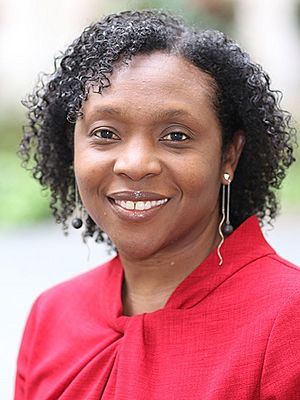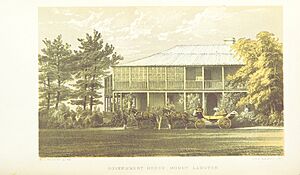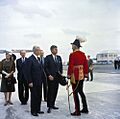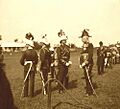Governor of Bermuda facts for kids
Quick facts for kids Governor of Bermuda |
|
|---|---|

Flag of the governor of Bermuda
|
|
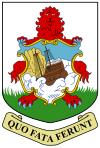
Coat of arms of Bermuda
|
|
| Viceroy | |
| Style | Her Excellency |
| Residence | Government House |
| Appointer | Monarch of the United Kingdom |
| Term length | At His Majesty's Pleasure |
| Formation | 1612 |
| First holder | Richard Moore |
| Website | Page on gov.bm |
The Governor of Bermuda is the person who represents the British monarch (the King or Queen) in Bermuda. Bermuda is a British overseas territory, which means it's a part of the United Kingdom but has its own government. The Governor's official title is Governor and Commander-in-Chief of the Somers Isles (alias the Islands of Bermuda).
The Governor acts as the head of state for Bermuda. They are responsible for choosing the Premier, who is the head of government. The Governor also appoints 11 members to the Senate, which is like the upper house of Bermuda's Parliament.
The Governor is also the commander-in-chief of Bermuda's military forces. This role used to involve a large group of soldiers. Today, it mainly involves the Royal Bermuda Regiment.
The current Governor is Rena Lalgie. She started her role on December 14, 2020. The Governor has a special flag in Bermuda. It is a Union Flag (the UK flag) with Bermuda's coat of arms on it.
History of the Governor's Role
Bermuda was first settled in 1609 when a ship called the Sea Venture was shipwrecked there. The first official settlers arrived in 1612, led by Richard Moore. He was the first deputy governor of Bermuda. His main job was to build forts and develop St. George's Town.
At first, a company in England, the Virginia Company, and later the Somers Isles Company, appointed the governors. But in 1684, the British Crown (the King or Queen) took over the direct control of Bermuda.
The system of government in Bermuda included an elected parliament, called the House of Assembly, which started in 1620. There was also a council that advised the governor.
After the American War of Independence in 1783, Bermuda became a very important military base for Britain. Because of this, many governors were senior military officers. This continued until the 1950s.
Governors sometimes faced challenges from the local parliament. For example, in the 1800s, governors tried to get the parliament to fund local military units, but the parliament often refused.
A sad event happened on March 10, 1973. Governor Sir Richard Sharples and his assistant, Captain Hugh Sayers, were killed. Two men were found guilty of the murders and were executed in 1977. This led to protests in Bermuda.
List of Governors of Bermuda
- 1612–1616 Richard Moore (Deputy Governor)
- 1616–1619: Capt. Daniel Tucker (Deputy Governor)
- 1619–1622: Nathaniel Butler
- 1622–1622: Capt. John Bernard
- 1622–1623: Capt. John Harrison
- 1623–1626: Capt. Henry Woodhouse
- 1626–1629: Capt. Philip Bell
- 1629–1637: Capt. Roger Wood
- 1637–1641: Capt. Thomas Chaddock
- 1641–1642: Capt. William Sayle
- 1642–1643: Capt. Josias Forster
- 1643–1644: Capt. William Sayle
- 1644–1645: The Triumvirate: Capt. William Sayle, S. Paynter, W. Wilkinson
- 1645: Capt. Josias Forster
- 1645–1647: The Triumvirate
- 1647–1649: Capt. Thomas Turner
- 1649–1650: John Trimingham (Elected by the People)
- 1650: J. Jennings
- 1650–1659: Capt. Josias Forster
- 1659–1663: Capt. William Sayle
- 1663–1668: Capt. Florentius Seymour
- 1668–1669: Samuel Whalley
- 1669–1681: Sir John Heydon
- 1681–1682: Capt. Florentius Seymour
- 1682–1683: Henry Durham (Acting Governor)
- 1683–1687: Col. Richard Coney
- 1687–1690: Sir Richard Robinson
- 1691–1693: Isaac Richier
- 1693–1698: Capt. John Goddard
- 1698–1700: Samuel Day
- 1701–1713: Capt. Benjamin Bennett
- 1713–1718: Henry Pulleine
- 1718–1722: Capt. Benjamin Bennett
- 1722–1727: Sir John Hope
- 1727–1728: John Trimingham
- 1728–1737: Capt. John Pitt
- 1737–1738: Andrew Auchinleck
- 1738–1744: Alured Popple
- 1744–1747: Francis Jones
- 1747–1751: William Popple
- 1751–1755: Francis Jones
- 1755–1763: William Popple
- 1763–1764: Francis Jones
- 1764–1780: George James Bruere
- 1780: Thomas Jones
- 1780–1781: George Bruere the younger
- 1782–1788: William Browne
- 1788–1794: Henry Hamilton (Lt. Gov.)
- 1794–1796: James Crawford
- 1796: Henry Tucker
- 1796: Lieutenant-Colonel William Campbell
- 1796–1798: Henry Tucker
- 1798–1803: General George Beckwith
- 1803–1805: Henry Tucker
- 1805–1806: Major Francis Gore (Lt. Gov.)
- 1806: Henry Tucker
- 1806–1810: Brigadier John Studholme Hodgson
- 1810–1811: Samuel Trott
- 1811–1812: Sir James Cockburn
- 1812 William Smith
- 1812–1816: Major-General George Horsford (Lt. Gov.)
- 1814–1816: Sir James Cockburn
- 1816–1817: William Smith
- 1817–1819: Sir James Cockburn
- 1819: William Smith
- 1819–1822: Lieutenant-General Sir William Lumley
- 1822–1823: William Smith
- 1823–1825: Lieutenant-General Sir William Lumley
- 1825–1826: William Smith
- 1826–1829: Lieutenant-General Sir Tomkyns Hilgrove Turner
- 1829: Robert Kennedy (Acting Governor)
- 1829–1830: Lieutenant-General Sir Tomkyns Hilgrove Turner
- 1830 Robert Kennedy (Acting Governor)
- 1830–1832: General Sir Tomkyns Hilgrove Turner
- 1832–1835: Colonel Sir Stephen Remnant Chapman
- 1835: Henry G. Hunt (Acting Governor)
- 1835–1836: Robert Kennedy
- 1836–1839: Major-General Sir Stephen Remnant Chapman
- 1839–1846: Major General Sir William Reid
- 1846: Lieutenant-Colonel William N. Hutchinson (Acting Governor)
- 1846–1852: Admiral Sir Charles Elliot
- 1852–1853: Lieutenant-Colonel William Hassell Eden (Acting Governor)
- 1853: Lieutenant-Colonel George Philpots (Acting Governor)
- 1853: Major Soulden Oakley (Acting Governor)
- 1853: Lieutenant-Colonel Thomas C. Robe (Acting Governor)
- 1853: Major Soulden Oakley (Acting Governor)
- 1853–1854: Admiral Sir Charles Elliot
- 1854: Lieutenant-Colonel Montgomery Williams (Acting Governor)
- 1854–1859: Colonel Freeman Murray
- 1859: Colonel Andrew T. Hemphill (Acting Governor)
- 1859–1860: Colonel William Munro
- 1860–1861: Colonel Freeman Murray
- 1861–1864: Colonel Harry St. George Ord
- 1864: Colonel William Munro (Acting Governor)
- 1864–1865: Lieutenant-Colonel William George Hamley (Lt. Gov.)
- 1865–1866: Colonel Harry St. George Ord
- 1866–1867: Lieutenant-Colonel William George Hamley (Lt. Gov.)
- 1867: Colonel Arnold Thompson (Acting Governor)
- 1867–1870: Sir Frederick Edward Chapman
- 1870: Colonel William Freeland Brett (Lt. Gov.)
- 1871–1877: Maj. Gen. Sir John Henry Lefroy
- 1877: Colonel William Laurie Morrison (Acting Governor)
- 1877–1882: Lieutenant-General Sir Robert Michael Laffan
- 1882–1888: Lt. Gen. Sir Thomas Lionel John Gallwey
- 1888–1891: Lt. Gen. Edward Newdegate
- 1892–1896: Lt. Gen. Thomas Lyons
- 1896–1901: Lt. Gen. Sir George Digby Barker
- 1898-1898: Lt. Col. William Andrew Yule (acting)
- 1902–1904: Lt. Gen. Sir Henry LeGuay Geary
- 1904–1907: Lt. Gen. Sir Robert MacGregor Stewart
- 1905: Colonel Arthur Noel Roberts (temporarily acting)
- 1907–1908: Lt. Gen. Sir Josceline Wodehouse
- 1908–1912: Lt. Gen. Sir Frederick Walter Kitchener
- 1912–1917: Lt. Gen. Sir George M. Bullock
- 1914: Lt.-Col. George Bunbury McAndrew (Acting Governor)
- 1917–1922: Gen. Sir James Willcocks
- 1919: Lieutenant-Colonel HB DesVouex (acting)
- 1922–1927: Lt. Gen. Sir Joseph John Asser
- 1927–1931: Lt. Gen. Sir Louis Jean Bols
- 1931–1936: Lt. Gen. Sir Thomas Astley Cubitt
- 1936–1939: General Sir Reginald John Thoroton Hildyard
- 1939–1941: Lt. Gen. Sir Denis John Charles Kirwan Bernard
- 1941–1943: The Rt. Hon. Viscount Knollys
- 1943: WL Murphy (acting)
- 1943–1945: Honorary Colonel Lord Burghley
- 1945 – May 1946: William Addis (acting)
- May 1946 – 1949: Admiral Sir Ralph Leatham
- 1949: William Addis (Acting Governor)
- 1949–1955: Lt. Gen. Sir Alexander Hood
- 1955–1959: Lt. Gen. Sir John Woodall
- 1959–1964: Maj. Gen. Sir Julian Gascoigne
- 1964–1972: The Rt. Hon. Lord Martonmere
- 1972–1973: Sir Richard Sharples (assassinated)
- 1973: IAC Kinnear (acting)
- 1973 – 7 April 1977: Sir Edwin Leather
- 7 April – 6 September 1977: Peter Lloyd (acting – 1st tenure)
- 1977 – 30 December 1980: The Hon. Sir Peter Ramsbotham
- 1 January – February 1981: Peter Lloyd (acting – 2nd tenure)
- February 1981 – 15 March 1983: Sir Richard Posnett
- 14 February – July 1983: Mark Herdman (acting)
- 1983–1988: The Rt. Hon. Viscount Dunrossil
- 1988–1992: Major-Gen Sir Desmond Langley
- 25 August 1992 – 4 June 1997: The Rt. Hon. Lord Waddington
- 4 June 1997 – 27 November 2001: Thorold Masefield
- 27 November 2001 – 11 April 2002: Tim Gurney (acting)
- 11 April 2002 – 12 October 2007: Sir John Vereker
- 12 October – 12 December 2007: Mark Andrew Capes (acting)
- 12 December 2007 – 18 May 2012: Sir Richard Gozney
- 18–23 May 2012: David Arkley (acting)
- 23 May 2012 – 2 August 2016: Hon. George Fergusson
- 2 August – 5 December 2016: Ginny Ferson (acting)
- 5 December 2016 – 12 December 2020: John Rankin
- 14 December 2020 – present: Rena Lalgie
Images for kids
See also
- Colonial Secretary of Bermuda
 | Laphonza Butler |
 | Daisy Bates |
 | Elizabeth Piper Ensley |


